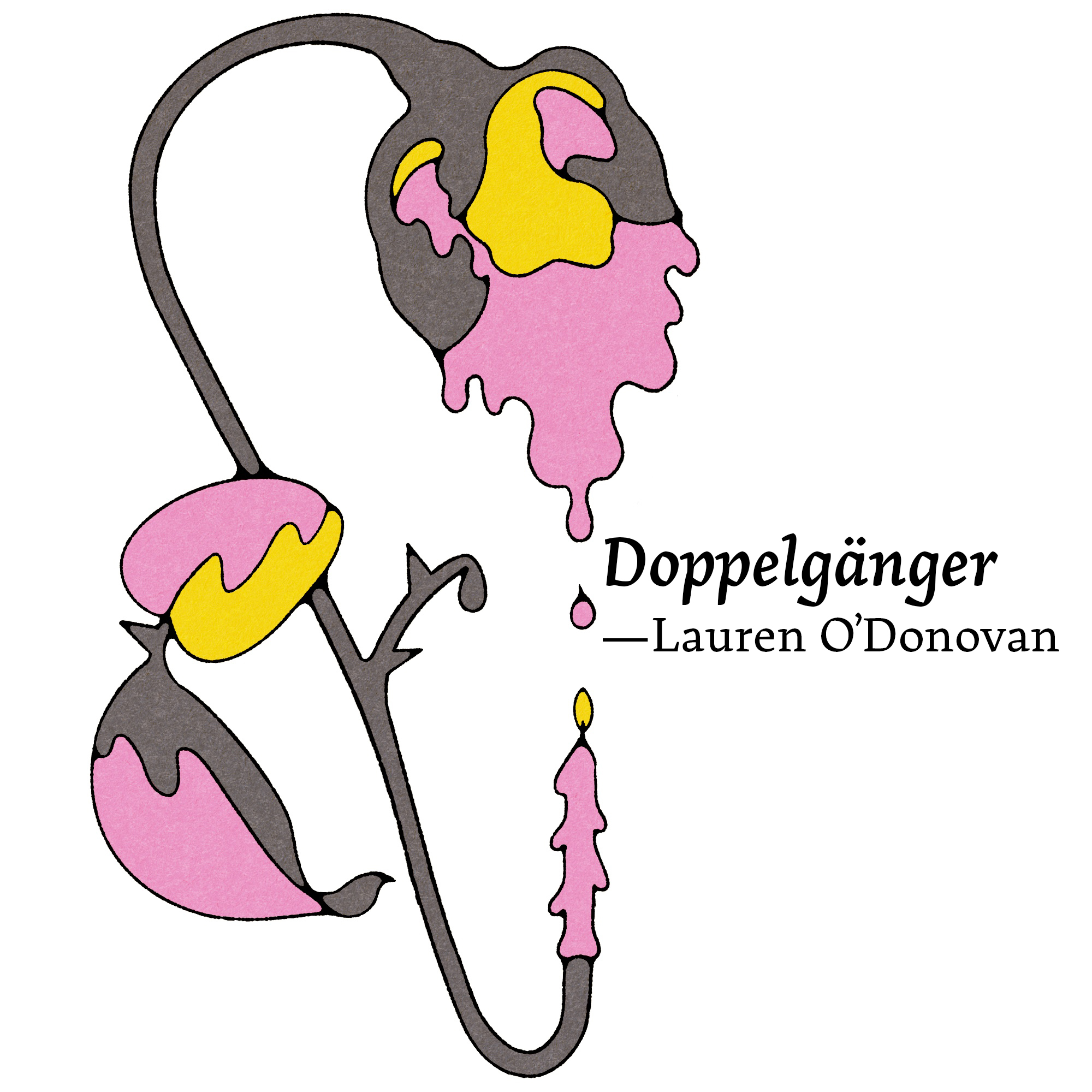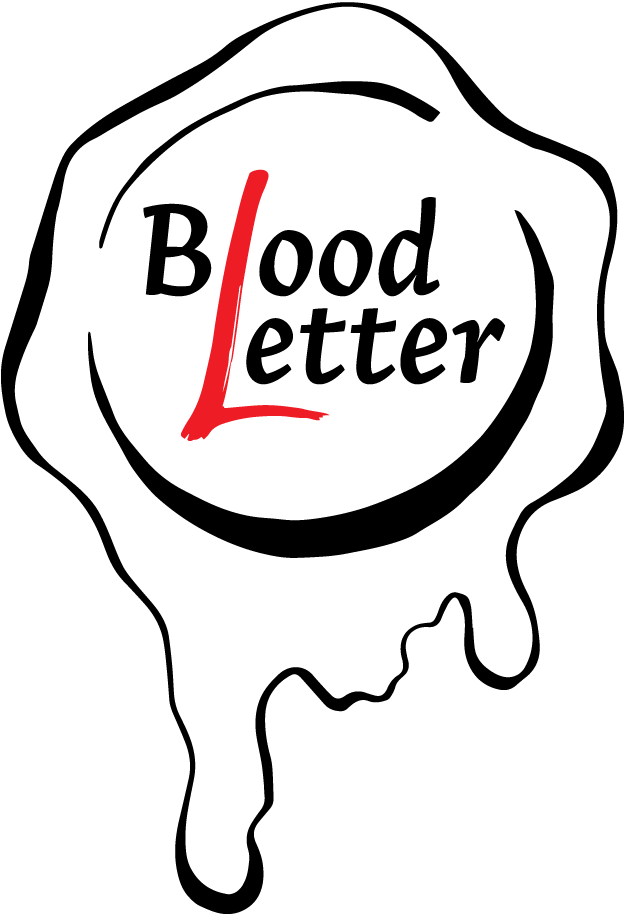Doppelgänger

I can’t move. Since yesterday morning, I’ve been lying here, on this bed, my body orchestrating its own minor adjustments to ease the cramps that periodically seize my limbs. But I myself can’t move. I try to make the decision to make a movement—any movement: a finger twitch, an ankle pop, an eyeblink, a hip shift—but the decisions spin in circles, dizzying my mind, sticking to the insides of my skull. The decisions refuse to be thought like those words I want to say but they decline to be said and instead glue themselves to my cheek, to my palette, and prevent all sound escaping.
I stare at my fingers—familiar, yet strange. Curled by my face like a devastated rose, they are mottled white and veined with blue. The triangular scar on my wrist, a memento from a childhood accident, is unmistakable. Yet, the origins of a slender scar running down the inner seam of my index finger and a long, fresh scratch on my arm, recently scabbed, elude me. Confused by my body, I consider the radiator through my splayed hand. Each digit is a bar of a prison cell, and the radiator, with its aged, sallow paint—the colour reminding me more of aged bile than intentional décor—stands guard like a silent jailer against the backdrop of the room’s horrific flower-embossed, maroon wallpaper. The radiator’s dry skin is peeling in the bottom corners revealing bone-white ceramic beneath. I want to pull at the paint, chip at it until it is pure and bright, but the decisions won’t play nicely and so I still cannot move.
“Oh, my darling,” a voice says, and I feel a weight behind me, sinking onto the edge of the bed.
“My poor, poor darling. You have not had it easy, have you? You are right to lie here and to rest. Rest is what you need.”
The voice is soothing like a cold cloth on a fevered face. I listen to the voice, immensely glad to have something else to focus on other than my own thoughts.
“But as you rest—life goes on. Life is for the living, after all. All those things that need all that doing. I can help you, my sweet, poor darling. Let me help you.”
“Help…me,” I say after much struggle to push sound out through the word-glue thick in my mouth.
I feel my skin become looser, sagging like melted wax. The separation is not painful, but I am aware of capillaries retreating and fatty layers detaching. Soon, my skin is an oversized dress and I am lost within it. The voice pulls on my top lip, pulls it up and over my head like a hood and down my back and over and off my feet with my arms turned inside out and my fingers dangling limp.
And then I see my drooping shell begin to inflate from my toes all the way up to my hair until I am looking at my body outside myself, perfectly shaped except for empty eyes that contain nothing but air and a view of the back of my hollow head.
“My darling, you’ve done so well! Just one more thing,” my skin says as it leans over the bed and plucks out my eyeballs, one then the other, and pops them in the airy sockets.
“Rest now, dearest. I’ll take care of everything. You will see.” My skin leaves the room and locks the door behind it.
And I did see. I saw the voice in my skin walk about, living my life, talking to my friends, laughing with my children. I saw it open my mail and pay a bill. I saw it clean the toilet and cook the dinner—lamb stew. I saw it sit and watch afternoon soaps on television, then make tea while managing the weekly schedule stuck to the fridge. I saw it walk my dog, chat with my neighbour, buy milk, bread, and eggs, along with a bag of groceries for the old lady that lives alone in the corner house. When it visited my father’s grave in the evening, leaving fuchsia and gerbera daisies in the small vase pinned to the plaque while crying salty tears, I saw all that too.
That night, with everyone else asleep, I hear the door unlock and my skin walks into the room. I see what I look like lying on the bed unbound from skin; a giant raw steak wrapped round with butcher’s string.
“I have done for you what I said, have I not? But now it is night and you must be cold without your skin.”
My skin collapses, folding upon itself like a suit of clothes thrown to the floor. My eyeballs, freed, roll until they end resting against one leg of the radiator. The voice picks up my skin and starts stuffing me back in, first my feet, and then my arms, and then up over my head. I watch it all from my view on the floor, resting at an angle against the warm leg of the radiator, until the voice returns my eyes to my sockets with a wet sucking noise and once again I am whole.
“Rest, my love. I will return again tomorrow.”
And it did. It returned again the next day, and the next, and the next, until I lost track of all the days and steak and skin became one and the same. I saw Christmas dinners and Sunday roasts and birthday cakes and sugar cookies for every season. I saw the leaves drop and the snow fall and daffodils explode each Spring. I saw my children grow up, and leave, and grow children of their own. I saw my dog get sick and die, saw the lady living in the corner house get sick and die. I saw my skin become older and more strange, less and less like me, and more a wrinkled other-entity.
I saw it all, but all the days my body and mind were in the room, confined behind lock and key, and all the nights when I was whole in the room, I was imprisoned by my feeble brain, locked within my own skin.
Until one day when I am alone on the bed with a shaft of sunlight toasting my raw back. I feel sharp pains in my abdomen and a frantic breathlessness comes upon me. I lie, struggling for air, unable to call out, for minutes or for hours, until—inevitably, and yet suddenly all the same—my last breath escapes and my body lies still, silent, empty. I now stand outside myself, outside my home of fat and flesh and brilliant white bone. My height is right, and I can move about and speak and even shout. All my difficulties with decisions and words and sticky glues have been left behind in my cooling body. I am completely invisible. I can see, I can see all around me, but of this new me I can’t see anything at all.
After some time exploring the limits of my new state, I turn, and to my surprise my dead body is gone. Instead, my younger living self lies prone on pale bed sheets printed with tiny, cornflower blue daisies that I have not seen in twenty years. I see her—weak, immobile, staring unblinking at the radiator through spread fingers. Her beautiful hair is tangled and thick with grease, clumped in matts on dirty sheets.
“Oh, my darling,” I say.
Lauren O’Donovan is an Irish writer. In 2023, she won the Patrick Kavanagh Award, the Cúirt New Writing Prize, and was runner-up for Poetry Business Book & Pamphlet Competition and the Listowel Writers’ Week Collection Award. She is fortunate to have her work sometimes published in journals and anthologies, most recently in Rattle Magazine, Southword, and The North.
